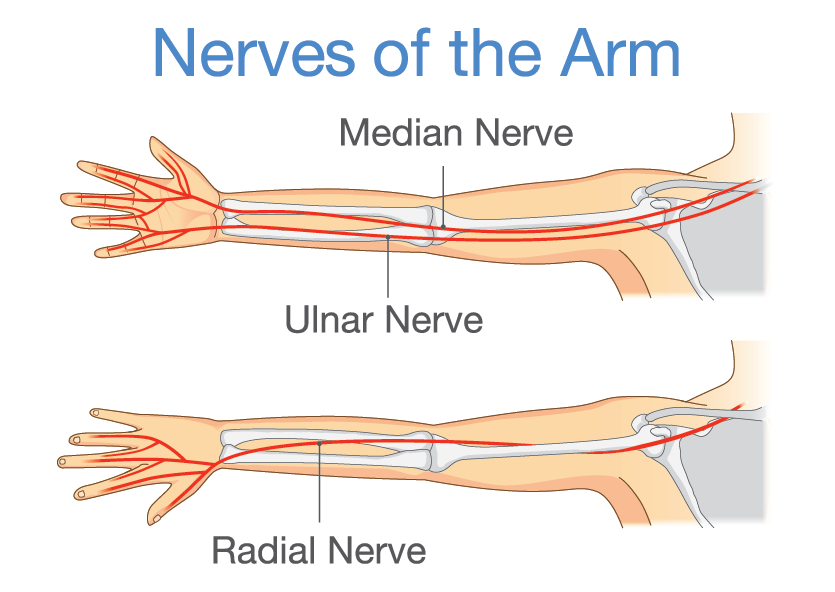Nerve Damage in the Hand
Nerve damage in the hand refers to any injury or impairment to the nerves that transmit signals between the hand and the brain, enabling sensations and motor functions. Nerve damage can range from mild to severe and may result in various symptoms, including pain, numbness, tingling, weakness, and even loss of coordination.
Peripheral Compressive Neuropathies in Orthopedics:
Peripheral compressive neuropathies refer to conditions where peripheral nerves are compressed or entrapped at specific anatomical sites, leading to nerve dysfunction and related symptoms. Hand and wrist issues include some common peripheral compressive neuropathies such as carpal tunnel syndrome (median nerve compression) and cubital tunnel syndrome (ulnar nerve compression).
Why Seek Orthopedic Care for Hand/Wrist Nerve Damage?
- Specialized Diagnosis: Orthopedic physicians are skilled in diagnosing the underlying causes of hand and wrist pain, numbness, and weakness. They can identify whether the symptoms are related to nerve compression and the specific nerve affected.
- Treatment Expertise: Orthopedic specialists are well-equipped to provide a range of treatment options for nerve compression issues. They can offer both nonsurgical and surgical interventions based on the severity of the condition.
- Conservative Management: Orthopedic physicians can recommend non-invasive approaches, such as splinting, physical therapy, and activity modification, to relieve nerve compression and manage symptoms.
- Surgical Intervention: In cases where conservative measures aren’t effective, orthopedic surgeons can perform specialized procedures to release compressed nerves, alleviate symptoms, and improve hand/wrist function.
- Collaboration: Orthopedic doctors often collaborate with other specialists, such as neurologists, to ensure a comprehensive approach to diagnosing and treating nerve-related issues.
Causes
Nerve damage in the hand can be caused by a variety of factors, including:
- Trauma: Injuries such as fractures, dislocations, or crush injuries can damage the nerves in the hand.
- Compression: Prolonged pressure on a nerve, often due to repetitive movements or improper positioning, can lead to nerve damage. Conditions like carpal tunnel syndrome involve nerve compression in the wrist, which can affect the hand.
- Medical Conditions: Certain medical conditions like diabetes, autoimmune disorders, and infections can cause nerve damage. These conditions may affect the nerves’ ability to function properly.
- Inflammation: Inflammation around the nerves, often due to conditions like arthritis, can lead to nerve damage.
Areas Affected in the Hand: Damage to different nerves can affect different areas of the hand, leading to specific symptoms:

- Median Nerve: Compression of the median nerve in the wrist can cause carpal tunnel syndrome, leading to numbness, tingling, and weakness in the thumb, index, middle, and part of the ring finger.
- Ulnar Nerve: Damage to the ulnar nerve can cause numbness and tingling in the pinky and ring fingers, often referred to as “ulnar claw” or “cubital tunnel syndrome.”
- Radial Nerve: Injury to the radial nerve can lead to weakness in wrist and finger extension, resulting in difficulty gripping and lifting objects.
Treatment Options
The treatment for nerve damage in the hand depends on the severity, cause, and specific nerves affected. Treatment options include both nonsurgical and surgical approaches:
Nonsurgical Treatments
- Rest and Immobilization: Resting the hand and avoiding activities that aggravate the symptoms can help alleviate nerve irritation.
- Physical Therapy: Exercises and stretches can improve flexibility, strength, and coordination in the hand and wrist.
- Medications: Pain relievers, anti-inflammatories, and in some cases, nerve-specific medications can help manage pain and discomfort.
- Bracing: Wearing a brace or splint can help alleviate pressure on the affected nerve and provide support during healing.
Surgical Treatments
- Release Surgery: In conditions like carpal tunnel syndrome, surgical release of the compressed nerve may be necessary to relieve symptoms.
- Nerve Repair: Severely damaged nerves may require surgical repair or grafting to restore proper function.
- Nerve Transposition: In cases of chronic nerve compression, surgeons may reposition the affected nerve to relieve pressure.
- Microsurgery: Highly specialized procedures may be used to repair damaged nerves using microsurgical techniques.
Source Citations:
- American Academy of Orthopaedic Surgeons (AAOS): “Nerve Compression Syndromes of the Upper Extremity” Source
- Mayo Clinic: “Carpal Tunnel Syndrome” Source: https://www.mayoclinic.org/diseases-conditions/carpal-tunnel-syndrome/symptoms-causes/syc-20355603
- OrthoInfo (AAOS Patient Education): “Cubital Tunnel Syndrome” Source
If you are experiencing pain or other symptoms, call us at 925-939-8585 to make your appointment.
Patients Success Stories:
“Dr. Wong is the best and I’ll be back to her for the other hip when it is time for that to be done. Five stars!”
“My care was exceptional and my pain was immediately gone.”
“I can never say enough about how much better I am.”
“I’m a lifelong patient of Dr. Roth now! He made it a very good experience. I woke up a little dazed, but with no pain, and there’s no scar.”
